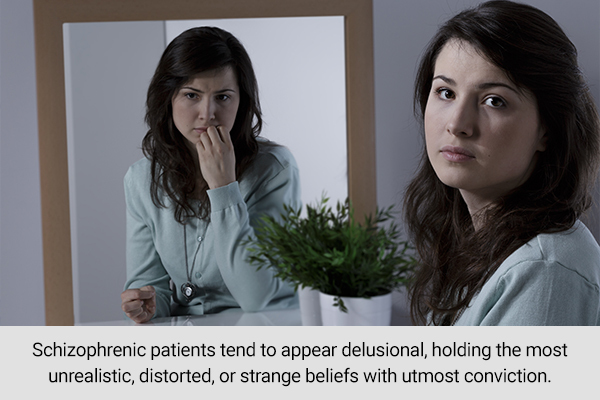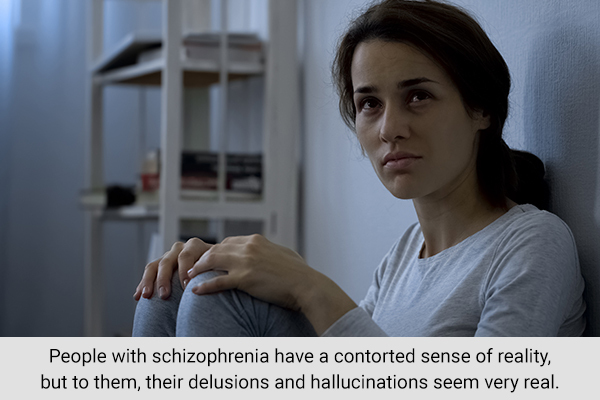In this article:
Schizophrenia is a chronic and challenging brain disorder that remains largely shrouded in controversy and misconceptions.

Much of this predominantly stems from the half-baked media narrative that assigns violent and disturbing connotations to it. Given the fact that this form of psychosis is still relatively uncommon, most people conveniently lap up this inaccurate and unjust representation instead of challenging it with factual analysis.
The general hostility and suspicion directed towards schizophrenia further alienate the people in the throes of this disease. Contrary to popular belief, people with schizophrenia rarely act upon their psychotic tendencies at the expense of others and are more likely to harm themselves than anyone else.
For the longest time, schizophrenia has been misconstrued as a simple case of split or multiple personality disorder, when in fact it is far more complex than that.
This kind of reductive understanding reinforces the notion that schizophrenics are disorderly to a troubling degree, lack basic self-control, and are potential threats to society. The last thing people struggling with legitimate mental health issues need is being judged for it.
To put it precisely, schizophrenics tend to blur the lines between what is real and what is imaginary, and this basic inability to make a distinction between the sensible and senseless lies at the crux of this cognitive malfunction.
Such is the disabling effect of this problem that most schizophrenic patients are rendered incapable of fending for themselves, both personally and professionally. It is safe to say that the impact of schizophrenia is not limited to the patient but affects entire families as well as friends who have to step up to the task of caring for them.
Disclaimer: Schizophrenia is a serious mental illness that should be treated under expert supervision. Thus, it is highly recommended to get the condition diagnosed and treated professionally as soon as possible.
Who Gets Schizophrenia?
Although not as prevalent as other well-known mental disorders, schizophrenia continues to be a pressing mental health issue nonetheless.
Of all the 23 million patients reported globally, the incidence of schizophrenia appeared to be higher among males (12 million) than females (9 million). However, on closer inspection, it was found that this was largely due to the fact that the problem begins to show earlier in men than women.
Thus, even though schizophrenia is equally common in both genders, the onset differs to a certain degree. Men are prone to develop this condition in their late teens or early 20s whereas women may exhibit initial symptoms in their 20s or early 30s. The sooner the symptoms appear, the more severe the course of illness is likely to be. (1)
Thus, teens and young adults together form the highest-risk demographic for schizophrenia. Very rarely though, children above the age of 5 can exhibit schizophrenic symptoms as well. Conversely, once a person is past 45, he/she is unlikely to develop this condition at all.
Causes of Schizophrenia

There is still a lot of ambiguity regarding the cause of schizophrenia, but some expert theories attribute the onset of schizophrenia to a number of genetic and environmental factors that work together to trigger this kind of psychosis in an individual.
Some of the prime culprits associated with the origins of schizophrenic tendencies include: (2)
1. Genetics
People with a family history of this disease have a greater predisposition to developing schizophrenia than those without.
Purely in terms of figures, if none of your family members have previously been diagnosed with schizophrenia, your odds of developing it are likely to be less than 1 percent. The risk, however, increases to 10 percent if either of your parents happens to be schizophrenic.
Research-based evidence suggests that a combination of different genes is responsible for this increased vulnerability rather than just one. While inheriting these genes might make one more susceptible, it does not guarantee that you will develop this disorder.
2. Drug abuse
Drug abuse can trigger schizophrenic episodes in people who are already prone to this disease. Certain drugs such as marijuana, amphetamines, LSD, or cocaine can disrupt the chemical balance in the brain and lead to psychosis.
3. Birth-related complications
Certain birth-related complications may hamper the brain development of the baby and, subsequently, contribute to the development of schizophrenia at a later stage in life. These include:
- Premature labor
- Low birth weight
- Expectant mothers who suffer from flu or any viral disease
- Lack of oxygen or asphyxia during birth
4. Brain complications
Research revealed slight structural and chemical anomalies in the brain of schizophrenic subjects that are not exclusive to this disorder alone and have been observed in mentally stable individuals as well.
However, there is reason to believe that schizophrenia can be traced back to an imbalance of neurotransmitters such as dopamine, serotonin, and glutamate, which are chemicals that carry messages between the nerve cells in the brain.
Some experts are of the opinion that this imbalance can even be rooted in prebirth complications that impair brain development in the fetus. On account of this imbalance, schizophrenics may have faulty connections between their brain cells, which translates in the way their brain reacts to external stimuli.
5. Stress
Stressful events and experiences such as loss of a loved one, turmoil related to a job or personal relationships, and physical, sexual, or emotional abuse can trigger schizophrenia in someone with a predisposition to a psychotic illness.
Symptoms Associated With Schizophrenia
Schizophrenia can have long-standing implications for your emotional, cognitive, and behavioral well-being. As most cases of schizophrenia begin during the teenage years, which itself is a transitional phase characterized by emotional, intellectual, and behavioral changes along with erratic mood swings, these symptoms are often lost in the confusion or dismissed as teenage tantrums.
The symptoms associated with schizophrenia do not present uniformly among all patients. In some cases, you might get a clear inkling that all is not well due to conspicuous symptoms, whereas others may only reveal schizophrenic traits when they start expressing their thoughts.
Besides variations in the type of symptoms, the way they manifest also differs from person to person. In addition, the symptoms can be exacerbated by stress and lack of coping skills.
The symptoms of schizophrenia are broadly classified into the following categories depending upon their inherent nature:
- Positive symptoms are essentially psychotic symptoms that are not observed in healthy individuals; these symptoms cause the patient to lose touch with reality. Symptoms such as hallucinations and delusions are referred to as positive as they are beyond the purview of “normal experience.”
- Negative symptoms, as the name suggests, are identified with a lack of normal emotions and behaviors. These include a general withdrawal from the outside world, activities, and social interaction, speaking in a monotone, showing an abnormal lack of facial expressions, negligence for personal hygiene, and inability to express emotions and feel pleasure. These symptoms often set in years before the first schizophrenic episode occurs in the prodromal period. These mild aberrations continue to remain below the radar but gradually become more and more apparent. It is harder to pin down schizophrenia purely on the basis of these initial symptoms, as a lot of them apply to other mental conditions as well and can easily be confused for depression or bipolar disorder.
- Cognitive symptoms relate to various aspects of thinking such as impaired memory, attention, and concentration. Such symptoms are often too subtle to detect without adequate testing.
- Disorganization symptoms usually present in the form of disorderly behavior, distorted speech, or both.
Symptoms can become worse without proper treatment and can be more difficult to treat with a patient that is not compliant with treatment.
Some of the common symptoms include:

- Hallucinations that entail imaging things that exist purely in your mind to be real are symptomatic of this form of mental disorder. Schizophrenic patients report hearing, seeing, smelling, feeling, or tasting things that are not real. For the patients, however, these sensory experiences are as real as it gets. The most common form of hallucination associated with schizophrenia is hearing voices.
- Schizophrenic patients tend to appear delusional, holding the most unrealistic, distorted, or strange beliefs with utmost conviction.
- They demonstrate poor executive functioning, which means they have trouble processing and applying the most basic information for decision making. This shows in their complete inability to plan or organize their life.
- People with schizophrenia have trouble keeping up with their own thought process and drift from one idea to another. This reflects in their communication as well, which is usually hard to follow as they jump from one topic to another for no apparent reason.
- Schizophrenics may exhibit a general lack of interest and derive no pleasure from any activity or relationship.
- People with schizophrenia tend to be suspicious of people’s motives and intentions to the extent of full-fledged paranoia. As a result, they isolate themselves from most people and even express irrational anger or fear towards those dear to them.
- They are prone to unprovoked outbursts and spells of agitation and uninhibited activity. Just the same way, they may fall into an unexplained state of emotional and behavioral lull and indifference where they may not respond to even the most significant situations.
- They often harbor suicidal thoughts and are more likely to be a threat to themselves than others.
- They display a complete lack of personal hygiene and self-care.
- They experience difficulty in socializing with people and usually appear uncomfortable at gatherings. They prefer to lead reclusive lives, rather than go through the discomfort of initiating or sustaining a conversation.
- They often exhibit inappropriate body positioning.
- Schizophrenics find it hard to retain and recall information, even if they have learned or acquired it in the recent past.
- Schizophrenics may find it incredibly difficult to fall asleep.
- They may dress inappropriately, which might reflect a lack of association with their surroundings and a complete disregard for their appearance.
Treatment for Schizophrenia
Because the exact cause of this disorder still remains unidentified, medical research has failed to come up with a cure for schizophrenia. Thus, most of the available treatment strategies for schizophrenia are directed towards managing the symptoms and keeping the patients functional enough to lead productive lives.
Some people are more responsive to treatment than others, but professional medical assistance remains indispensable for the management of schizophrenia.
Your healthcare provider will prescribe the appropriate course of action after taking into account all the relevant markers and will choose from the following mix bag of treatment options:
1. Medications

Your doctor may prescribe “antipsychotic” medications to mitigate the symptoms of schizophrenia by reducing the biochemical imbalance in the brain as well as to prevent relapses.
These drugs are usually taken daily in either pill or liquid form, along with antipsychotic injections that may be administered once or twice a month. You will have to work with your doctor to come up with the ideal combination and dosage of antipsychotic medication that is best suited for your particular case.
Under no circumstance should you self-medicate, and always take these medications under the supervision of a mental health professional.
2. Psychosocial treatments
Once you and your doctor have zeroed in on a medication regime that works best, psychosocial therapy follows as the next step of your treatment journey. Through these treatment sessions, your doctor will impart the necessary coping mechanisms to help you brave the everyday ordeals associated with schizophrenia.
This step is essential for regaining basic life skills and easing the daily struggle that keeps schizophrenic patients from pursuing the most mundane tasks such as cooking, cleaning, stress management, shopping, socializing, attending school, or showing up for work.
Moreover, psychosocial treatment helps patients assess how their thoughts and behavior are influenced by the people and society they live in and thereby develop ways to address problematic tendencies.
3. Early intervention teams
As soon as the doctor diagnoses you with the first episode of schizophrenia, he/she will refer you to a team of specialists that includes psychiatrists, psychiatric PAs, psychologists, mental health nurses, social workers, and support workers.
This early intervention team provides multifaceted yet coordinated support services in terms of medication and psychosocial therapy as well as educational and vocational opportunities to help the one recover from the early blow of this psychosis. You will be expected to start treatment within 2 weeks of referral.
Diagnosing Schizophrenia

If your doctor suspects that you might be suffering from schizophrenia, he/she will conduct a thorough examination of your medical and psychiatric history.
Because schizophrenia shares a number of common symptoms with other mental health problems such as bipolar syndrome or schizoaffective disorder, the doctor will first rule out all other possibilities before reaching a conclusive diagnosis.
To that end, a number of tests and a comprehensive psychological evaluation will help your healthcare provider exclude the role of prescribed medication or substance abuse and properly assess your condition and its cause.
For it to be schizophrenia, the diagnosis must meet the following criteria:
- If you experience at least two of the commonly associated symptoms of schizophrenia for most part of a month. These symptoms typically include delusions, hallucinations, incoherent speech, and catatonic thoughts or behavior, or negative symptoms such as blunted emotions.
- Your symptoms are debilitating to the extent that you are unable to perform everyday tasks, attend school or conduct your studies, and carry out your professional commitments.
- Your symptoms persist for longer than 6 months.
- All other potential causes, such as recreational drug use or other mental health issues such as bipolar disorder or depression, have been ruled out.
Your Attitude Towards Schizophrenia Treatment Matters

Although schizophrenia patients live in denial about their warped sense of reality, the first step towards health improvement once you have been diagnosed with this condition is to come to terms with it rather than fighting it.
It is very important that you remain committed to the treatment process by taking your medicines on time and keeping up with your medical and therapy appointments religiously. You will also have to help yourself by adopting various lifestyle changes that are recommended for your particular condition.
- Make time for some exercise in your daily schedule. You can adjust the degree of physical activity according to your convenience and mood. Something as simple as a light 20-minute stroll in the evening would suffice to fulfill your daily quota of exercise. You can also opt for more vigorous sessions, preferably for 20 minutes three times a week. This form of adrenaline rush will accelerate your pulse rate and help enliven your mood.
- Swear off substance abuse. If you are in the habit of consuming alcohol or taking illicit drugs to dull your symptoms, you must seek prompt medical help to get over this form of substance abuse as it will adversely interfere with the efficacy of your prescribed medication and aggravate your symptoms.
- Don’t let the stigma of schizophrenia deter you from getting better. The lack of credibly informed discourse about mental health has resulted in a lot of unfounded fears and misnomers that shape people’s understanding of issues such as schizophrenia. It is very important for someone who is diagnosed with this problem to tune out such false noise. You must believe in the recovery process for it to work. Surround yourself with people who see you more than just a schizophrenia patient and give you the respect, love, and support that you deserve.
- Seek reassurance from your doctor that you are getting the best treatment possible. Work closely with your doctor by remaining proactively involved in the treatment process and communicating any concerns that you may have with regard to possible side effects or doubts about the choice of medicine and its dosage.
- Sign up for self-help strategies that will help you manage the symptoms better. A multipronged treatment approach covers a lot of bases in comparison with a single-handed reliance on medication alone. You must take ownership of your own well-being and go for regular therapy.
- Don’t push yourself in a corner; let your friends and family support you through this problem. Schizophrenia can be a very isolating condition. It is extremely important that you fight your inherent impulse to distance yourself from everyone, even those who mean the best for you. Surrounding yourself with friends and family who understand your inner struggle can make you feel less alone in social settings and help you make the transition back into daily social life smoother. Plus, it will help you stay on track on the road to recovery. Schizophrenic patients and their family members can even join self-help and support groups to get a better perspective of how to go about this condition.
- Aspire to lead a meaningful life. Don’t reduce your life to your illness alone. Despite the obvious obstacles, there’s still no dearth of opportunities for you to have wholesome life experiences. You are just as entitled and equipped to lead fruitful and fulfilling professional and personal lives as anyone else. You must set your life goals and work towards achieving them.
- Eat healthily. Diet plays an important role in just about any treatment strategy, and the same holds true for schizophrenia. You can help your chances by consuming a well-balanced diet, with lots of fresh vegetables and fruits. Moreover, people in the throes of this condition are often advised to include fish oil, (3)(4) glycine supplements, (5)(6) and antioxidant-rich foods (7) in their diet.
- Quit smoking. Try not to smoke. Cigarettes harm your lungs, your heart, your circulation, and your stomach. Moreover, smoking could play a causal role in the onset of schizophrenic spectrum disorders and may also affect the effectiveness of the medication you are taking. (8)(9)
Help Your Loved Ones

Schizophrenia can be quite a debilitating experience for those suffering from it. It thus becomes the duty of their friends and family members to step up and form a security net around them.
However, before one can go about helping someone with schizophrenia, it is essential to educate yourself about this complex condition. You must act from an informed and empathetic position, or else you will only make it worse for the sufferer. Here are some ways you can show support:
- Always hold your cool when responding to someone with schizophrenia. People with schizophrenia have a contorted sense of reality, but to them, their delusions and hallucinations seem very real. Dismissing their symptoms as being imaginary will only turn them hostile toward any help that you may have to offer. It is better to meet them halfway by calmly explaining that you see things differently. Treat them with respect and understanding, rather than with judgment.
- People with schizophrenia find it difficult to focus and are often unable to process the information presented to them in a logical manner. This mental handicap, in turn, renders the simplest of tasks quite difficult to accomplish. Moreover, someone with a twisted sense of logic may not react to things in the same way as those with intact mental faculties. This can be frustrating, but it isn’t anyone’s fault.
- You must treat people with schizophrenia as equal beings. A patronizing tone will only alienate them further. Always remain respectful when hearing them out, no matter how bizarre their delusions may be. However, if you feel that their behavior is bordering on dangerous such that they might jeopardize their own well-being or someone else’s, do not tolerate it. Be supportive and kind, but make no allowances for dangerous or inappropriate behavior.
- Help them identify potential triggers so that they can avoid them. You cannot expect someone who is out of touch with reality to have a clear and objective understanding of what is happening to them. It falls upon their well-wishers to make them understand and avoid the situations that trigger their symptoms or cause a relapse or disrupt normal activities.
- The only way to reason with a schizophrenic is through an empathetic approach. There’s no point in arguing with them in an effort to show them the fallacy of their delusions or hallucinations. Instead, focus on the feelings that might be causing them to have these delusions or hallucinations.
- The responsibility of ensuring that the patient does not fall of their medication routine must be shared by their friends, family members, and other caregivers. A lot of patients with schizophrenia start reducing their medication dosages the moment they register any form of relief. Some may even harbor reservations about the side effects of the medication and try to skip them. In such cases, it is your job as a well-wisher to encourage the patient to take his or her medication regularly so that the symptoms don’t come back or get aggravated.
- Get acquainted with various support services for care providers through your loved one’s care team, provincial or territorial health services, or community organizations.
- If you suspect that your loved one is turning to drugs or alcohol, get him/her immediate professional help before it spirals into a full-blown substance use disorder. These toxic substances are known to exacerbate schizophrenia symptoms and trigger psychosis.
- You should not undermine your own mental and physical health while caring for someone else’s. Looking after someone with schizophrenia can take a lot out of you, and it is essential that you know where to draw the line. You can play your part by supporting them through the struggle and helping them to be safe, get therapy, and take the prescribed medications. However, there’s only so much you can do in managing someone else’s psychosis. It may help to join a support group for loved ones of patients with schizophrenia and seek counseling for the entire family.
Can Schizophrenia Be Prevented?

Although there aren’t any safeguards to prevent schizophrenia from developing, working with your doctor to identify potential risk factors can help your odds.
If nothing else, knowing that you may fall within the at-risk category should better prepare you in the event that your apprehensions do come true and start proactive treatment to contain psychotic symptoms.
Ongoing research has also focused on susceptible populations that show a greater predisposition to this condition to possibly come up with ways to prevent it.
Complications of Schizophrenia
Most schizophrenic patients are so convinced by their delusional state, compounded by the fact that they constantly question people’s motives and intentions that it can be hard to get them the help they need.
In the absence of timely and proper treatment, this disease can go out of hand and spring a number of long-standing complications, which include:
- A constant struggle with suicidal tendencies and thoughts that might result in self-induced death
- Afflicting injury and trauma to oneself
- Crippling sense of depression
- Excessive reliance on alcohol, tobacco, and other drugs
- Anxiety disorders and obsessive-compulsive disorder (OCD)
- Inability to perform at work
- Dwindling educational performance
- Social withdrawal resulting in isolation
- Health and medical problems
- Being victimized
- Legal and financial distress and homelessness
- Rare aggressive outbursts
When to See a Doctor
The minute you suspect possible symptoms of schizophrenia in yourself or someone else, waste no time in getting professional help from your GP.
The sooner you start treatment, the better the prognosis is going to be. It is important to emphasize the need to seek professional consultation with a psychiatrist.
Unlike many other medical diseases, schizophrenia is best treated in a multimodal approach that involves professional caregivers, family, and friends. (10)(11) This article is intended to describe the process of this disease, but not at all to replace the primary treating professional for a schizophrenic patient.
Final Word
You can take comfort in the fact that schizophrenia is fairly manageable, so long as you follow your doctor’s advice and remain committed to the recovery process.
Educating yourself about the condition and understanding the risks involved is imperative to improve your mental health and prevent recurring or relapsing episodes.
- Was this article helpful?
- YES, THANKS!NOT REALLY


